Suction Line Freezing Up On Refrigerator: Expert Diagnosis
We may earn affiliate fees for purchases using our links (at no additional cost to you).
Have you ever opened your refrigerator to find a layer of ice on the back wall? Or perhaps noticed that your fridge isn’t cooling as well as it used to?
One possible culprit could be suction line freezing up on the refrigerator. But what causes this phenomenon, and how can you fix it?
In this article, we’ll dive into the reasons behind suction line freezing on a refrigerator and provide practical solutions to remedy the issue. We’ll also provide insights and tips from renowned experts in the field to ensure you have the most up-to-date information.
So let’s get started and keep your fridge running smoothly!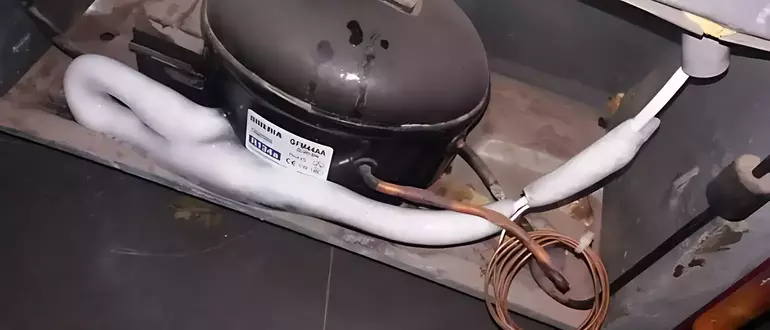
Understanding the Suction Line in Your Refrigerator
When you think of a refrigerator, you likely picture the familiar box-shaped appliance with a door that swings open to reveal shelves and drawers filled with food and drinks.
While it may seem like a simple device, a refrigerator is a complex system of components working together to keep your food fresh and cold. One of these components is the suction line.
Defining the Suction Line
The suction line is an essential part of a refrigerator’s cooling system. It is a tube that runs between the compressor and the evaporator coil and is responsible for carrying low-pressure refrigerant gas from the evaporator to the compressor.
The suction line is typically larger in diameter than the discharge line, which carries high-pressure refrigerant gas from the compressor to the condenser coil.
How the Suction Line Works
When the compressor in your refrigerator turns on, it creates a low-pressure area in the suction line.
This low pressure causes the refrigerant gas to flow from the evaporator coil, where it has absorbed heat from the interior of the refrigerator, into the suction line.
The gas then travels through the suction line and into the compressor, where it is compressed into a high-pressure gas.
This high-pressure gas then flows through the discharge line and into the condenser coil, where it gives off heat and condenses back into a liquid.
Maintaining the Suction Line
To ensure that the suction line in your refrigerator is working properly, it’s important to keep up with regular maintenance tasks.
This may include cleaning the condenser coils, replacing the air filter, and checking the refrigerant level.
If you notice that your refrigerator is not cooling as well as it should be, or if you hear strange noises coming from the compressor, it’s important to call a professional technician to diagnose and fix the problem.
Causes of Suction Line Freezing Up on a Refrigerator
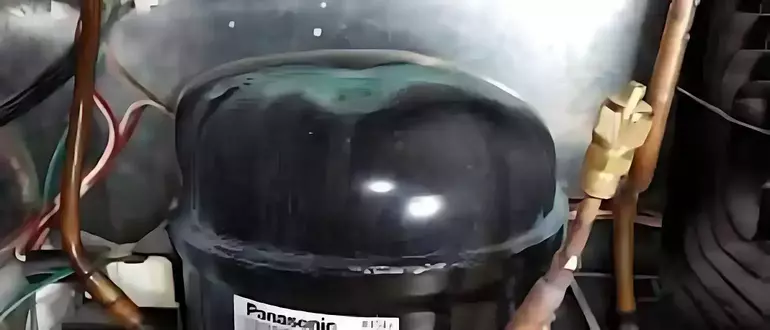
If you notice that your refrigerator is not cooling properly, it could be due to several different issues. One common problem is a frozen suction line.
When the suction line in your refrigerator freezes, it can cause a buildup of frost or ice on the evaporator coils, which can lead to reduced cooling performance and potentially even damage to your appliance.
Here are some common causes of the suction line freezing on a refrigerator:
Low Refrigerant Levels
If there is not enough refrigerant in the system, the pressure in the suction line can drop too low, causing moisture in the air to freeze on the coils. This can also cause your compressor to overwork, leading to potential damage.
Blocked Airflow
If there is not enough air flowing over the evaporator coils, it can cause moisture to accumulate and freeze on the coils. This can be caused by a dirty air filter or a blocked air vent.
Malfunctioning Defrost System
If the defrost system in your refrigerator is not working properly, it can also lead to a frozen suction line.
When the defrost system is not functioning as it should, ice can build up on the coils and eventually cause the suction line to freeze.
Faulty Thermostat
If the thermostat in your refrigerator is not working properly, it can cause the system to run continuously, which can lead to a frozen suction line. This can be caused by a malfunctioning thermostat or a faulty temperature sensor.
Faulty Fan Motor
If the fan motor in your refrigerator is not working properly, it can cause a lack of airflow over the evaporator coils, leading to a frozen suction line.
Signs of Suction Line Freezing Up on a Refrigerator
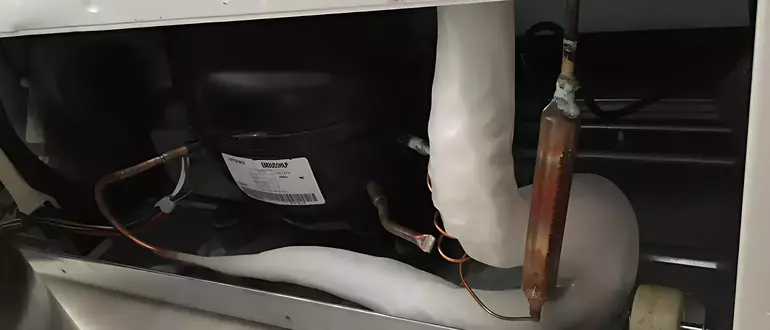
A frozen suction line in your refrigerator can cause a variety of issues, including reduced cooling performance and potential damage to your appliance.
It’s important to recognize the signs of a frozen suction line so that you can take action to fix the problem before it gets worse.
Here are some common signs of a suction line freezing on a refrigerator:
Reduced Cooling Performance
One of the most noticeable signs of a frozen suction line is reduced cooling performance. You may notice that your refrigerator is not keeping your food as cold as it should be, or that the freezer is not freezing items as quickly as it normally would.
A buildup of Frost or Ice
Another common sign of a frozen suction line is a buildup of frost or ice on the evaporator coils. This can be seen by looking inside the refrigerator or freezer and checking for a layer of frost or ice on the coils.
Strange Noises
If your refrigerator is making strange noises, it could be a sign of a frozen suction line. The compressor may be working harder than usual to try to maintain the proper temperature, which can lead to strange noises such as banging or rattling.
Hot Compressor
If the compressor in your refrigerator feels hot to the touch, it could be a sign of a frozen suction line. When the suction line freezes, it can cause the compressor to overwork, leading to excessive heat buildup.
Water Leaks
Another potential sign of a frozen suction line is water leaks. When the coils become covered in frost or ice, the excess moisture can drip down and create puddles or water damage.
Preventing Suction Line Freezing Up on a Refrigerator
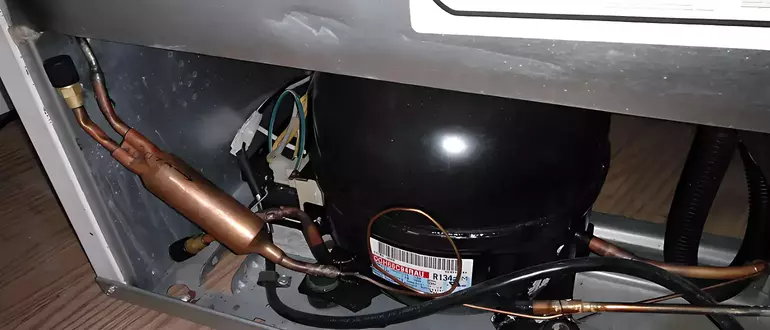
A frozen suction line in your refrigerator can cause a variety of problems, including reduced cooling performance and potential damage to your appliance.
Fortunately, there are several steps you can take to help prevent suction line freezing from occurring. Here are some tips to keep your suction line from freezing up on your refrigerator:
Keep the Coils Clean
Dirty evaporator coils can restrict airflow and lead to a buildup of frost or ice on the coils, which can contribute to a frozen suction line. To prevent this, make sure to clean the coils regularly using a soft brush or vacuum cleaner.
Maintain Proper Airflow
Proper airflow is essential for preventing suction line freezing. Make sure that the air vents in your refrigerator are not blocked by food or other items, and that the door seals are in good condition.
Check Refrigerant Levels
Low refrigerant levels can cause the suction line to freeze. To prevent this, make sure to have your refrigerator’s refrigerant levels checked regularly by a professional technician.
Check the Defrost System
A malfunctioning defrost system can also contribute to suction line freezing. Make sure that your refrigerator’s defrost system is working properly, and that the defrost timer, thermostat, and heating element are all functioning as they should.
Check the Thermostat
If the thermostat in your refrigerator is not working properly, it can cause the system to run continuously, which can lead to a frozen suction line.
Make sure that your thermostat is functioning correctly and that it is set to the proper temperature.
Have Regular Maintenance
Regular maintenance can help prevent suction line freezing by ensuring that your refrigerator is in good working condition.
Schedule regular maintenance checks with a professional technician to catch any potential issues before they become bigger problems.
Fixing Suction Line Freezing Up on a Refrigerator
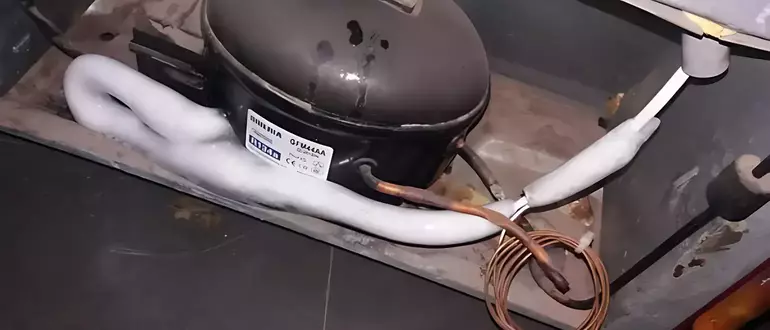
If you notice that your refrigerator’s suction line is frozen, it’s important to take action to fix the problem before it causes further damage to your appliance.
Here are some steps you can take to fix the suction line freezing on a refrigerator:
Unplug the Refrigerator
The first step in fixing a frozen suction line is to unplug the refrigerator to prevent further damage to the appliance.
Defrost the Coils
The next step is to defrost the evaporator coils to remove any built-up frost or ice. You can do this by leaving the refrigerator unplugged for several hours, or by using a hairdryer or a hot towel to melt the ice.
Check the Defrost System
Once the coils are defrosted, it’s important to check the defrost system to ensure that it is working properly.
This may involve checking the defrost timer, thermostat, and heating element to make sure they are all functioning correctly.
Check the Refrigerant Levels
If the suction line froze due to low refrigerant levels, it’s important to have a professional technician check and refill the refrigerant levels to the appropriate amount.
Check the Fan Motor
If the fan motor is not working properly, it can contribute to suction line freezing. Make sure that the fan motor is functioning correctly and that it is providing proper airflow over the evaporator coils.
Check the Thermostat
A faulty thermostat can also contribute to suction line freezing. Make sure that the thermostat is functioning properly and that it is set to the correct temperature.
Call a Professional
If you are unable to fix the suction line freezing on your own, or if you are unsure of what the problem is, it’s important to call a professional technician to diagnose and fix the issue.
Fixing Suction Line Freezing Up on a Refrigerator at Home
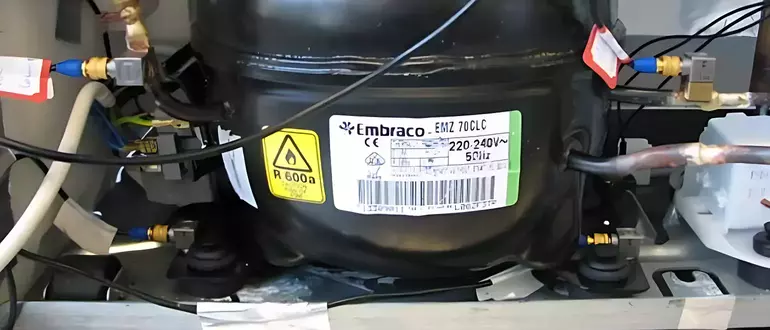
If you notice that your refrigerator’s suction line is frozen, you may be wondering if you can fix the problem yourself at home.
While some minor issues can be fixed at home, fixing the suction line freezing on a refrigerator can be a complex and potentially dangerous task.
Here are some factors to consider when deciding whether to fix the suction line freezing on a refrigerator at home:
Safety Concerns
Fixing a frozen suction line in a refrigerator involves working with refrigerant, which can be dangerous if not handled properly.
Refrigerant can cause skin and eye irritation, and it can also be harmful if inhaled. For this reason, it’s important to be trained and equipped to handle refrigerants safely.
The Complexity of the Issue
Suction line freezing on a refrigerator can be caused by a variety of issues, including low refrigerant levels, a malfunctioning defrost system, a faulty thermostat, or a faulty fan motor.
Diagnosing and fixing the problem requires knowledge and experience with a refrigerator repair.
Tools and Equipment
Fixing suction line freezing on a refrigerator may require specialized tools and equipment that may not be readily available in a typical household.
For example, you may need a multimeter to check electrical components or a refrigerant recovery system to safely remove and replace refrigerant.
Warranty and Insurance
Attempting to fix the suction line freezing on a refrigerator at home may void the manufacturer’s warranty or your insurance policy, which could potentially cost you more money in the long run.
FAQs
How Can I Prevent The Suction Line From Freezing On My Refrigerator?
Can The Suction Line Freezing On A Refrigerator Be Fixed At Home?
What Should I Do If I Notice Signs Of A Suction Line Freezing On My Refrigerator?
Is Suction Line Freezing A Common Problem With Refrigerators?
Final Words
A suction line freezing up on a refrigerator can cause a range of issues, from reduced cooling efficiency to complete system failure.
However, there are several possible causes of this problem, and a range of solutions are available depending on the underlying issue.
By taking the time to properly diagnose the root cause and implementing the appropriate fix, you can ensure that your refrigerator runs efficiently and effectively for years to come.
As always, it’s important to consult with a qualified expert if you’re unsure of how to proceed, to ensure the safety of yourself and your appliance.